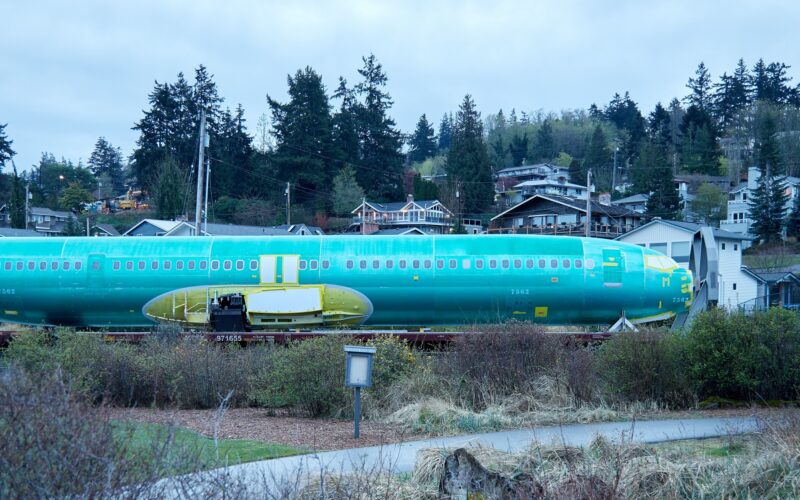Boeing has been forced to look for a solution to continue receiving 737 MAX and P-8 Poseidon fuselages at its factories in Washington after a rail bridge collapsed.
The fuselages are transported via rail between Spirit AeroSystems, which manufactures the ‘pickles’, in Wichita, Kansas, and Renton, Washington. However, a key rail bridge over the Yellowstone River collapsed on June 24, 2023, when a train carrying asphalt fell into the river.
According to a report by The Air Current, Boeing is now lifting the unpainted and unfinished 737 fuselages, which do not include parts such as wings, horizontal and vertical stabilizers, onto trucks near the crash site. Once the heavy goods vehicles (HGV) cross the Yellowstone River, the fuselages can be transferred onto a train and transported to Renton, Washington to be fully assembled.
Boeing currently produces the 737 MAX and the P-8 Poseidon, a military derivative of the 737 NextGeneration family, which is the predecessor of the 737 MAX family.
Locally based outlet KTVQ reported that The Unified Command, made up of officials from several US federal and state government agencies, believes that the rail bridge will be repaired in “weeks” rather than months.
It is not immediately clear how or if this will impact on the production rate of the 737 MAX.
737 MAX Production issues
Boeing has had to deal with several production issues affecting the 737 MAX throughout 2023.
In March, a report detailed that not taken up (NTU) aircraft of the type had possible software issues when being reconfigured to be operated by another airline.
Meanwhile, in April 2023, a separate issue was discovered by Spirit AeroSystems, after an employee noticed that “a non-standard manufacturing process was used on two fittings in the aft fuselage section of certain 737 airplanes,” according to a statement from the company at the time.
During the same month, Boeing’s president and chief executive officer David Calhoun said that while the issue would not affect the planned ramp-up of production rates, delivery delays related to the fittings issue were estimated to remove “approximately 9,000 seats from our customers’ summer schedules”.
During the Bernstein Strategic Decisions Conference in June 2023, Calhoun clarified that the production issue had “probably costs us 25 airplanes in a year”.
“The rate increase that we have projected in the middle of this year, that’s going to happen,” he continued.
Boeing resumed delivery of inventoried 737 MAX aircraft in May 2023. Spirit AeroSystems estimated that the problem would cost it at least $31 million in financial impact in 2023.
AeroTime approached Boeing for comment.

